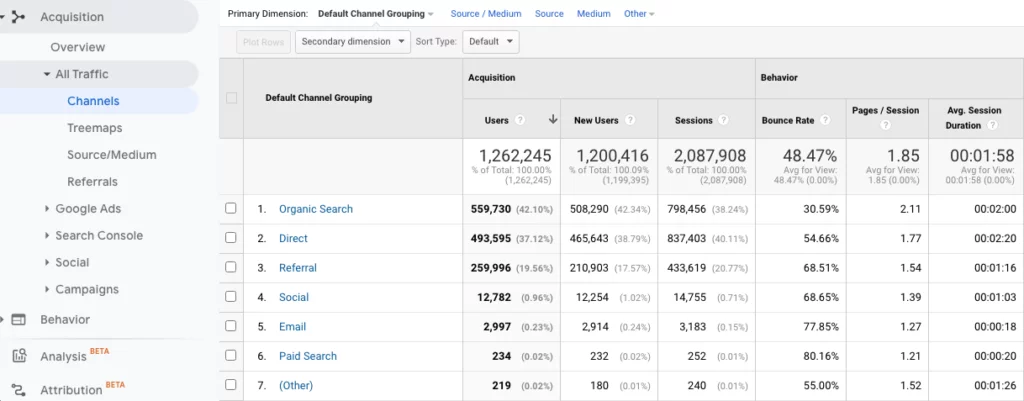Making the right choice on your SEO agency is one of the most crucial decisions that an organization can make. If you get it right, you’ve got a partner that will grow with you and help take your business to the next level. If you get it wrong, it could set the company back months and harm the bottom line. I know that sounds scary, but I’m going to give you a few tips on how to get the right company the first time you’re looking for help.
Whether you’ve decided to completely outsource your SEO work (81% of companies do) or you’ve decided to hire an agency to work with your in-house team, with the help of the right agency, any business in any industry can have success. I’m going to outline a few things that are going to separate mediocre agencies from great ones.
Step 1: Clearly Define Your SEO Goals
SEO isn’t voodoo or witchcraft, so don’t waste your time with companies that treat it that way. SEO is a process of optimizing your website to rank higher in search engine results pages (SERPS) and should result in an increase of qualified organic traffic to the website. I’m not saying that SEO is easy or often misunderstood, but what I’m saying is if you’re talking with a company and they have some secret sauce to doing it, chances are they’re using blackhat tactics.
SEO has a lot of different metrics, and they’re all important, but to measure success, we have first to determine and then measure what matters. Here are a few of the more common SEO metrics:
Organic Traffic
Organic traffic is usually the first metric that an agency will discuss because it measures how many people found your webpage from a search engine. Organic traffic is easy to track using by navigating to Acquisition>All Traffic>Channels>Organic Search.

Bounce rate
Bounce rate is a metric used to measure the percentage of people who land on a web page and do nothing else. It means they get to a particular page and don’t click a link, fill out a form, or read more. Google will often use the bounce rate as a quality metric of a website.
Is high bounce rate a bad thing?
The answer depends solely on the primary goal of the page. A high bounce rate of a checkout page on an e-commerce store is much more alarming than a high bounce rate with the company’s privacy policy page.
Total Keywords Ranked by Google
Using tools like SEMrush, you’re able to see not only the total but the position of the keywords that your website ranks is ranking for in Google. While usually the more keywords that your page ranks for, the better the results are going to be, it’s essential to make sure that your page is ranking for relevant terms for your website.

There are plenty of other metrics that can measure the success of a campaign, but I wanted to give you a basic understanding of some of the terms and what they mean. Choosing the metrics that matter for you go back to what I said earlier about measuring what matters.
Tip 2: Check Awards, Case Studies, Reviews, and Testimonials
Every agency will have clients that have been happy with their experience, along with clients that weren’t. SEO isn’t an exact science, and some industries are very competitive. Another problem is that business owners often wait until their business is already struggling to pull the trigger and invest in digital marketing.
It’s important to remember that SEO isn’t a silver bullet that will fix all of your problems, and patience is key here. You didn’t screw up your online presence in only 90 days, so don’t expect to have it all fixed in that type of timeframe. SEO reminds me a lot of an old Chinese proverb that says, “The best time to plant a tree was twenty years ago. The second best time to plant a tree is now.”
Most people don’t choose a blender on Amazon before reading the reviews and doing some homework on the brand and model that they’re thinking of buying, but many people don’t put the time in research and SEO agency accurately. It seems that most people hop on Google, type in a term, and click on the first thing they see. You would think that the first thing you see in Google would mean it’s the best, right? It’s the number one position. The trouble here is many people clicked on an ad that has zero to do with organic rankings!
The easiest way to check for quality work is by going to the agency website and looking for industry recognition. Any agency that has been recognized by the industry will proudly display those badges on their website.
While you’re on the website, most agencies are also going to have a case studies section that shows off some of their work. It’s a little harder to judge here than by industry recognition because some clients may not permit to use them for a case study, but if the agency has enough happy clients, they’re bound to have a few who don’t mind.
Finally, you can check review sites and see what other businesses have rated the agency. To find reviews, it can be as easy as going to a Google My Business page, a Facebook Page, or a more savvy user, may go to Clutch.
Step 3: Set a Budget
As a business owner trying to figure out what to spend on SEO, it’s crucial to remember what we discussed earlier, that SEO is not something that you start and should expect to see immediate results. Doing SEO is a lot like working out, at the beginning the results might be tough to measure, and you could feel like giving up, but just like working out, SEO is going to start to show you measurable results when you’re hitting milestones like three months, six months, and as you continue your program.
Remembering all of what was said, you have to put together a dollar amount that your company is comfortable spending on digital marketing every month. If your business can’t afford the dollar amount that you’re coming up with, then that isn’t your budget. If the choices are pay for marketing or pay the payroll, you’re going to have to reduce the marketing budget, although some would argue that if you don’t properly market your business, you’re going to have payroll problems later.
Your SEO budget should be a percentage of your overall marketing budget, and the percentage is going to vary based on your goals, competitive landscape, and expected return on investment. An e-commerce store will probably have a more significant percentage of advertising spent on digital marketing than a bakery would.
Step 4: Schedule a Consultation
It doesn’t matter if you’re choosing a local company down the street, or a national brand to do your SEO, before putting your signature on any papers you should schedule a consultation. I strongly recommend asking your sales consultant if someone from the SEO team can also join the discussion so that you’re able to ask questions around their process.
The first thing that I recommend that you ask about is how communication and reporting work. At our agency, LSEO, clients get a singular point of contact to keep the project moving forward, and deliver reporting. There are many moving pieces in SEO, and a single account may require multiple teams on the back end working together, therefore, having a singular point of contact instead of reaching out to four different individuals creates accountability and accuracy. During this time, I recommend expressing what your expectations for client communication are going to be. If you want emails, phone calls, a mixture of both, and their cadence are essential to establish.

The next thing I would recommend you do would be asking all of the questions you had for your sales consultant again. I’m not saying that salespeople will tell you that they can do things that aren’t possible within the scope and budget of your campaign, but asking your questions again, this time with the SEO team there ensures the alignment between sales and operations on your project.
Finally, I would ask the team to go over your strategy as detailed as possible once more. The sales consultant that you spoke with may have given you bullet points such as technical SEO, installing tracking tags on your website, link building, and touched on both on and off-page SEO strategy, but now you have one of their SEO strategists on the phone so that conversation can get a bit more granular. I would also recommend here asking what trends or new methods that the agency is trying and the success that they’ve had with them. If for nothing else, it puts you back in control, and asking the questions, but more importantly if they tell you that they’re not trying to innovate new, creative ways to get your websites to perform, they’re worth a price, but it’s not a premium price.
Step 5: Get a Proposal and Understand it Completely
You defined your goals, searched for a great agency, put together a budget you’re comfortable with, and had your consultation. Now it’s time to get a formal proposal. Most SEO agencies are going to work within three different models.
The first and most common model is a monthly retainer fee and a minimum of six to twelve-month commitment. If you’re choosing an agency and going the monthly retainer route, the areas that need to be clearly understood are the scope of work, payment amount, date, payment method, and cancellation policy. The cancellation policy is paramount. I want you to only sign with the best company for your business, but if you have to get out of an agreement, how are you able to do so with the contract in front of you?
The next type of engagement would typically be project-based. Projects generally are going to be full-scale audits that include implementation to either be carried out by the SEO agency, or your development team. It can be details like this that derail a project and leave a sour taste in both the client’s mouth and the agency’s mouth. Everyone must know who is accountable for what tasks before the project gets kicked off. The billing details are also relevant here when talking about the timing of payment. Read the proposal to understand the timing of the payment structure. There are many ways to construct a suitable payment structure. Payment can come either before the project starts or once completed. Many companies will use a hybrid model where billings happen based on project milestones.
The last type of engagement is an hourly consulting agreement. This type of arrangement is the least common and not offered by all agencies. This method is generally suited for lower budget projects or for a business that only needs a few hours of work done because it already has an in-house digital team.
The last type of engagement is an hourly consulting agreement. This type of arrangement is the least common and not offered by all agencies. This method is generally suited for lower budget projects or for a business that only needs a few hours of work done because it already has an in-house digital team.

